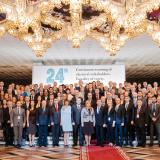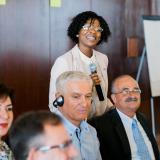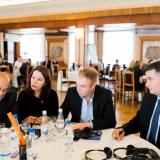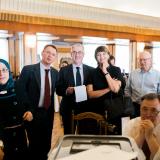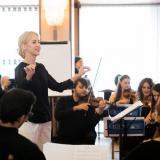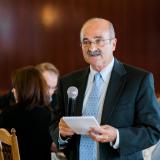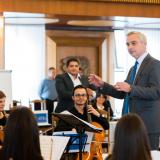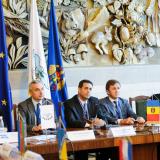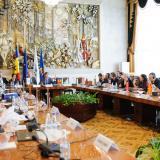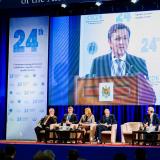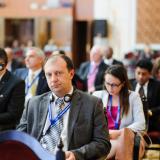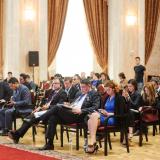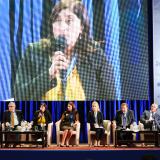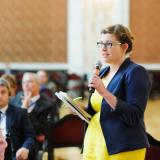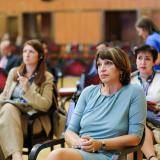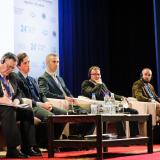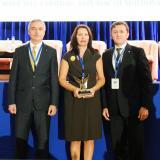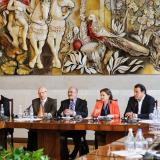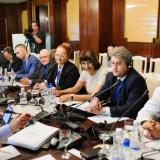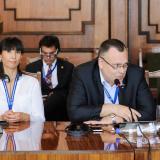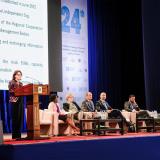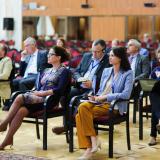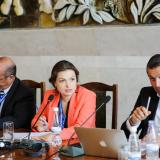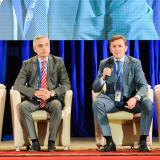Continuous training of electoral stakeholders
and
Equality of voters, equality of votes
Chisinau, Moldova
9-11 September 2015
Side event
Interactive workshop on training methods
Chair: Zsolt Szolnoki, Secretary General, ACEEEO
Moderator: Anna Sólyom, External Expert, ACEEEO
Thuleka M. Kholisa, Program Officer, A-WEB
Training of electoral officials on countng of votes and recording of results
Thuleka M. Kholisa’s presentation
Natia Zaalishvili, Director, Centre for Electoral Systems Development, Reforms & Trainings, Georgia
Code of Conduct for Electoral Stakeholders
Natia Zaalishvili’s presentation
Catherine Barnes, Consultant, IFES
Electoral Leadership
Catherine Barnes’s presentation
Natalia Iuras, Director, Center for Continuous Electoral Training, Republic of Moldova
Reinventing Leadership and Gender Equality Trainings through Art
Natalia Iuras’s presentation
The side event of the conference offered a unique opportunity for election practitioners to observe and experience those different training methods that can be used to support the personnel of election commissions both on temporary and permanent basis. The event was supported by the Association of A-WEB and took facilitators around the clock.
Particpants, who have come from various organisations and countries enjoyed the demonstrated particpatory methodologies which served as the base of continuous training for election stakeholders. They learned that besides the professional content and a professional facilitator who guides its pupils it is very important to engage participants in activities where their experiences and knowledge can be part of the solution of a given task. With the usage of different approaches, such as: brainstorming, teamwork, icebreakers, moving people in the room, drawing and reporting back either for smaller groups or to everyone, and by experiencing how art can be part of a leadership training they also had the chance to try to conduct an orchestra. Thanks to the skillful and well prepared guidance of the facilitators, participants could have had a comprehensive understanding of the different methodologies which can complement other training approaches in the continuous training of electoral stakeholders.
Plenary session I.
Continuous training of electoral stakeholders
Moderator: Natalia Iuras, Director, Center for Continuous Electoral Trainings, Republic of Moldova
Speakers: Natalia Iuras, Director, Center for Continuous Electoral Trainings, Republic of Moldova
Bringing passion to Electoral Training
Natalia Iuras’s presentation
Planning and conducting elections is one of the most complex and challenging exercises for a country. CEC Moldova, as the biggest employer in the Country, created the Center for Continuous Electoral Training (CCET) which became the only specialized organization in the region that trains and certifies Electoral Officials, in order to make elections more credible. CCET means less classic lectures, more motivational trainings through art, public lessons for youth, informational promo buses, and E-learning platform - all that to convince our beneficiaries that we have solutions for any electoral gap they face and feel. CCET believes that a faultless work of the electoral officials is one of the objectives to ensure the right to free choice of Moldovan citizens. CCET also trains the civil society, to raise the competency to analyze and observe electoral processes. In order to make the training methods more comprehensive and inclusive, an E-learning platform was launched. Their next step is the mandatory certification practice of all electoral officials. Another priority is developing and expanding the contact with the world outside Moldova, as the Moldovan CCET experience is one that deserves to be shared and replicated.
Tamar Zhvania, Chairperson, Central Election Commission of Georgia
Overview of Electoral Training Programs in Georgia
Tamar Zhvania’s presentation
Georgia set up Electoral Culture development as a strategic goal which could be achieved through trainings, seminars, conferences, workshops, grants to political parties. Preconditions for an effective and productive trainings are involvement of professional board of trainers, well-designed training materials, well-chosen structure and delivery styles and meeting interests of target groups (EMB, political parties, media, NGO, voters). Georgia has implemented already many successful innovative projects, but still there is room for new ideas targeting to increase electoral awareness.
Dan Vlaicu, Vice Chairman, Permanent Electoral Authority of Romania
Training electoral stakeholders – the need for a specialized body of electoral experts: Romania’s experience
Dan Vlaicu’s presentation
The text is available here
According to the law, one of the Permanent Electoral Authority’s main tasks is training the persons with responsibilities in elections. Depending on eachtype of stakeholders, electoral training is provided not only when elections are organized and conducted, but also in the period between elections. Some of the training programs have a permanent character, but others have a periodic one.Recently two major reforms that were introduced in the new electoral law of Romania: the creation of a specialized body of electoral officials trained on a permanent basis by PEA’s specialized center for training, namely the Electoral Expert Centre and the computerization of polling stations. Training is a major component required to manage electoral processes effectively. Over the years, Romania got to the conclusion that without the existence of permanent training programs it is very difficult to train participants that have different levels of education and experience. The Electoral Expert Centre is seen as a solution to fill this gap.
Lefterie Luzi, Chairperson, Central Election Commission of Albania
Education of Voters. Vote education
Lefterie Luzi’s presentation
In Albania, the consideration that voters’ education runs only at the time of elections, widely prevails. In 2014, CEC Albania organized specific voters’ education programs in a broader concept which implied the education of all citizens in the country showing that between democracy and elections it is a strong and direct relationship. One of the opportunities that is used between elections to raise voter awareness is the Global Election Day when CEC Albania organize training sessions with various groups of interest such as young people and people with disabilities. A special focus for civic activities are persons with disabilities, minority groups, women and young voters. Customized materials and information programs are designed for each category. Future plans of CEC Albania include: strengthen and enhance the training capabilities, increase organizational and managerial effectiveness in planning the training and educational activities, increase training efficiency.
Francois Friederich, Head of the Division of Electoral Assistance, Council of Europe
Council of Europe and civic observers: training for democracy
Francois Friederich’s presentation
Division of Electoral Assistance of the Council of Europe has been working to enhance the monitoring capacities of domestic observers all over Europe and ACEEEO members can benefit from their experience and co-operation. Election observation is aimed at ensuring the conformity of the conduct of elections at different levels with national and international norms and practices. EMBs can benefit from civic observers’ input when it comes to enhancing the efficiency and transparency of the electoral process. The Division of Electoral Assistance stance ready to cooperate with those national election administrations interested in enhancing the capabilities of domestic observers and their contribution towards building better democracies in Europe.
Sergey Danilenko, Member, Central Election Commission of the Russian Federation
Continuous training of members of precinct election commissions: Russian experience
Sergey Danilenko’s presentation
In the Russian Federation, precinct election commissions (PEC) have a 5 years mandate. All members of these commissions should have a minimum knowledge in the field of election law and the election procedures. The “Russian Election Technologies Training Centre at the Central Electoral Commission of the Russian Federation” is the institution responsible for designing the training programs and materials. In the process of organizing and conducting the trainings, the CEC actively interact with higher educational establishments of the regions, including organizing trainings on the site of the universities, attracting faculty to conduct classes on the basis of superior election commissions or specialized training centers, as well as joint development of teaching materials. The permanent PECs are a historically significant and unique practice in world that allows Russian CEC to create truly professional polling station commissions that have the necessary qualification to conduct elections at all levels.
Armen Smbatyan, Secretary, Central Election Commission of Armenia
Continuous training of electoral stakeholders
Armen Smbatyan’s presentation
The Armenian Electoral Code provides that only those citizens who completed professional training courses on the administration of elections and have been awarded qualification certificates may be involved in the composition of precinct electoral commission. The observers who want to carry out observation mission in the polling station shall have also the qualification certificate for observers. In Armenia there are two types of trainings organized: trainings organized by the Central Electoral Commission and trainings organized by the Political Parties and NGOs. The CEC holds trainings for already formed PEC members. The CEC periodically organizes training for members of the Territorial Electoral Commissions. CEC members, CEC Staff and independent electoral experts conduct the training sessions. Political parties and candidates organize trainings for their proxies and NGOs organize trainings for observers. The CEC publishes the Electoral Code, manuals of CEC decisions, and guidebooks for the members of Precinct and Territorial election commissions. For raising voters’ awareness, during the National Elections the CEC prepared social rolls and cartoons on voting day procedures which were broadcast on State and private TV channels.
Plenary session II.
Equality of voters, equality of votes
Moderator: Andrei Volentir, Secretary, Central Electoral Commission of the Republic of Moldova
Speakers: Andrei Volentir, Secretary, Central Electoral Commission of the Republic of Moldova
A modern, efficient and accessible electoral process - guarantee for voter's equality
Andrei Volentir’s presentation
In Moldova persons with disabilities represent 5% of the population that means a real challenge for the electoral management bodies. The Law on Social Inclusion of Persons with Disabilities stipulates the legislative safeguards that were completed by the regulations adopted by the Central Election Commission. Polling stations were equipped with special ramps, for persons with visual disabilities different alternative voting and information materials are provided. People with hearing disabilities were able to participate in the electoral observation mission.
Rokas Stabingis, Member, Central Election Commission of Lithuania
Case study: equal voting power and boundary delimitation in Lithuania
Rokas Stabingis’s presentation
The parliamentary election system in Lithuania includes 71 single-member constituencies. According to the electoral law, following the requirements set by the Venice Commission, the number of voters in constituencies must be from 0.8 to 1.2 of the average number of voters in all single-member constituencies. However, 55% of the constituencies do not fit into range from 90% to 110% so the need of the boundary delimitation is obvious so the Central Election Commission is in front of a major reform. CEC employs geographers and launched an information system in the process.
Rumiana Stoeva-Siderova, Member, Central Election Commission of Bulgaria
Some special aspects of ensuring the equality of voters laid down in the Bulgarian legislation. Legal voting privileges for school and university students ensuring their active involvement in the electoral process
Rumiana Stoeva-Siderova’s presentation
In Bulgaria, various methods of facilitating and guaranteeing the equal suffrage are provided for people with reduced mobility, in medical institutions, elderly people health facilities and social service institutions; for persons engaged as election commission members. Equality of voters is expressed by the boundary delimitation, by the measures provided for the persons with disabilities. Central Election Commission puts emphasis on the voter education, targeting especially school children and students.
Subhi Jakupi, Vice-president, State Election Commission of Macedonia
The Principle of Equality of Votes: Challenges in Macedonia
Subhi Jakupi’s presentation
The text is available here
Since gaining its independence until today, the Republic of Macedonia has been faced several times with the challenge of finding an adequate model to fully respect equality of voting. Electoral acts of 1990 and 1998 established single-member constituencies and the State Election Commission determined the number of mandates in the multi-member constituencies. As there were no provisions for the permitted deviation thresholds relation to the number of voters from one constituency to another, very high deviations were notices. This system was abandoned by the electoral law of 2002 that stipulated that the number of voters in the electoral districts may deviate from -3% to +3% in relation to the average number of voters in the electoral districts. Act in 2006 increased the percentage to 5. At the last parliamentary elections in 2014, the deviation varied from -4,07% to +4,55%. The Republic of Macedonia continually aims to not only establish, but also maintain respect for the equality in voting principle.
Marian Muhulet, Director of Communication and International Affairs Department, Permanent Electoral Authority of Romania
Voter equality in Romania: logistical and legislative challenges
Marian Muhulet’s presentation
The text is available here
In 2014 Romania held presidential and European parliamentary elections and several by elections. Some modifications in the electoral law enabled the computerization of polling stations. Permanent Electoral Authority successfully implemented an SMS-based turnout monitoring system and operated an effective voter register. To enable the participation of vulnerable groups, PEA established partnerships with NGOs working on issues concerning persons with disabilities, national minorities, women, youth. All these measures have one objective: to ensure voters democratic framework in which they can freely decide and have equal voting rights and equal voting power.
Sarsembayev Marat Aldangorovich, Member, Central Election Commission of Kazakhstan
The principle of equality of voters in Kazakhstan and European Law
Equal suffrage forms also part of the Constitution of Kazakhstan and it is completed by the principle of the personality of voting by the electoral law. Under the constitution more than 30 elections were held. The Central Election Commission provides several supportive measures to enable the voting rights of the persons with disabilities such as a call center.
Workshops
A. Continuous training of electoral stakeholders
Moderator: Doina Bordeianu, Deputy Director, Center for Continuous Electoral Training, Republic of Moldova
Keynote speakers: Paul DeGregorio, Honorary Member, ACEEEO
It’s Complicated: Managing Elections in Modern Times
Paul DeGregorio’s presentation
There are some reasons that make elections complicated in modern times: computerized polling stations; out of country, early, mail-in and absentee voting; voting devices for people with special needs; use of the internet to provide voter information, registering to vote and transmission of ballots; determination of voter eligibility with different standards for different elections.
There are new institutions to serve new needs as the Institute for Democracy and Electoral Assistance, International Foundation for Electoral Systems, Venice Commission, Council of Europe, etc.
Some of the recommendations for nowadays and for the future are: stronger minimum qualifications for election officials, requirements for election administrators to participate in on-going qualified programs that would enhance their skills, partnerships with academic institutions or recognized election official organizations to provide programs and training in new innovations and new technology.
Suad Arnautovic, Member, Central Election Commission of Bosnia and Herzegovina
Methods for continuous education of election stakeholders – experiences of Bosnia and Herzegovina
Suad Arnautovic’s presentation
Importance of continuity of election stakeholders’ education is undoubted. In that light, continuous training of all participants in the election process in Bosnia and Herzegovina is a strategic commitment. CEC BiH finds this issue to be of high importance. As one of the way for continuity maintenance in training is the decision to establish the Centre for education within CEC BiH, which will be seated in the CEC BiH building, in the center of Sarajevo. Task of the Centre will be to develop training curricula for all participants in the election process, such as eligible voters, political party members, election implementation body members, journalists, observers, etc. That will be the hub in election education in BiH, sort of an election academy with possibility of election experts from outside of BiH as lecturers.
Jean-Pierre Kingsley, Honorary Member of ACEEEO
Training: a Critical Approach
By the end of the day, the Election Management Body is responsible for the training of election officials. Efficient training process involves development of the curricula, testing the training program, evaluation of the trainings and keeping the record of trained persons. Nowadays, the expectations from election administration are very big. This is why the training of electoral stakeholders is a must. Knowing the legal provisions and the electoral procedures is not enough. Moral principles and ethical behavior should be added in order to have election officials able to conduct credible and transparent elections.
Fabio Bargiacchi, executive director, European Center for Electoral Support
Delivering Cascade Training for Sustainability and Peer Exchanges
Fabio Bargiacchi’s presentation
The Leadership and Conflict Management Skills for Electoral Stakeholders (LEAD) course was developed by European Centre for Electoral Support (ECES) with funding from the European Union together with the Center for Creative Leadership (CCL).The LEAD training program is inspired by one key objective: the sustainability of all knowledge transfers. LEAD focuses on contents ‘appropriation through the implementation of a comprehensive training cycle, which includes different stages of certification.Since February 2012, the European Centre for Electoral Support (ECES) has signed more than 60 contracts in support of transparent, credible and inclusive electoral processes in more than 35 countries, with activities concentrated in Europe, Middle East and mainly Africa.
Gavin Weise, Chief Technical Advisor Elections, UNDP Albania
eLearning: Applications in Training of Election Officials
Gavin Weise’s presentation
E-learning is used in almost all corporate environments, extensively in some cases, and widely known in higher education. UNDP has e-learning courses on electoral assistance, ODIHR and COE have courses on electoral observation, and Secretaries of state in the US states have eLearning on electoral management and polling. Some of the CECs have begun to migrate some teaching and training to eLearning based applications as well. Learning Management Systems (LMSs) software application platforms used to facilitate a learning process. LMSs provide an instructor a way in which to create and deliver content, monitor learners' participation, communicate with learners and assess their performance.E-learning is a modern tool that helps overcoming the existing challenges in training and education for EMBs and presents the following advantages: higher retention, self-paced learning, instructional quality consistency, adaptive-interactive technologies, instant feedback and progress, etc.
B. Roundtable about the international standards on the equal suffrage
Moderator: Eszter Bodnár, Legal Adviser, ACEEEO
Participants: Gaël Martin-Micallef, Legal Officer, Secretariat of the European Commission for Democracy through Law (Venice Commission)
Steven Martin, Senior Adviser on New Voting Technologies, OSCE/ ODIHR
Andrey v. Baranov, Director, International Institute of Monitoring Democracy Development, Parliamentarianism and Suffrage Protection for the Citizens of the IPA CIS
Equal suffrage is one of the basic principles of democratic elections and forms a part of the European electoral heritage. It is included in the most important human rights documents and is part of almost every constitution. After the case studies of the plenary session, the workshop provided an opportunity to discuss with panelists representing the most important election-related regional organisations in Europe the international standards of equal suffrage.
With the help of their experiences and the indispensable contribution of the panelists, participants discussion covered the following subtopics: electoral systems’ effect on the equality; problems of constitutency delimitation; right to vote of voters abroad and voters belonging to minorities, discrimination based on nationality, national origin, ethnicity and residence; right to vote of vulnerable groups (people with disabilities, youth voters, women, voters in health institutions, voters in detention) and the methods of inclusive electoral procedure and the responsibility of electoral management bodies
Some current issues from the world of elections
Chair: NerminNisic, Chief of Party, IFES Georgia
Speakers: Giancarlo Defazio, Policy Officer, European Commission, DG Justice and Consumers, Unit ‘Union Citizenship rights and free movement’
The European elections: principles and best practices in the 2015 report of the European Commission
Giancarlo Defazio’s presentation
Badrieh Bilbisi, Secretary General, Organization of Arab Electoral Management Bodies
The Organization of Arab Electoral Management Bodies (ArabEMBs) - An Overview
Badrieh Bilbisi’s presentation
Catherine Barnes, Consultant, IFES
More Effective Training Through M&E
Catherine Barnes’s presentation
Peter Wolf, Technical Manager, International IDEA
Recent IDEA Publications on Elections and Technology
Peter Wolf’s presentation
Thuleka M. Kholisa, Program Officer, A-WEB
Recent & Upcoming AWEB activities
Thuleka M. Kholisa’s presentation
This session provided an opportunity for the participants to get an overview on the recent issues in the world of elections including the newest project of election-related global and regional organisations.
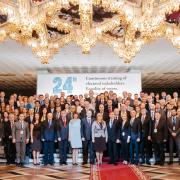 The conference had two main topics. ’Continuous training of electoral stakeholders’ emphasised an issue that is permanently on the agenda of electoral management bodies, whereas the topic of ’Equality of voters, equality of votes’ focused on an equally important matter related also to constitutional law. According to our tradition, in the prospect of our annual conference the possibilities were suggested for regional and cross-regional consultations, networking as well as for learning on recent developments in election technology.
The conference had two main topics. ’Continuous training of electoral stakeholders’ emphasised an issue that is permanently on the agenda of electoral management bodies, whereas the topic of ’Equality of voters, equality of votes’ focused on an equally important matter related also to constitutional law. According to our tradition, in the prospect of our annual conference the possibilities were suggested for regional and cross-regional consultations, networking as well as for learning on recent developments in election technology.

